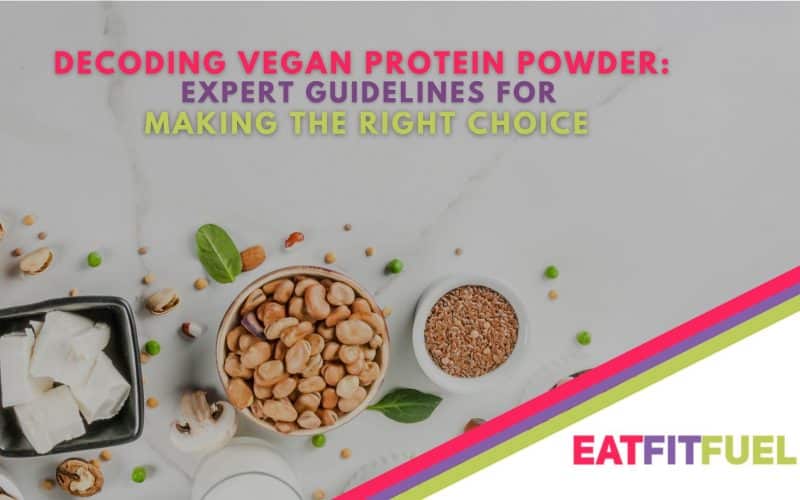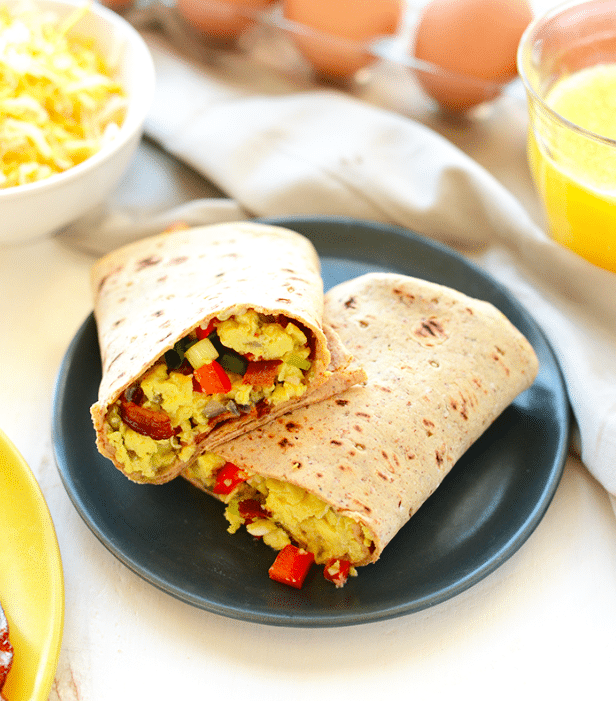The vegan protein powder market has exploded in recent years, with sales crossing $4 billion in 2022 alone. More people are now adopting plant-based lifestyles for health, ethical, and environmental reasons. Because of this, vegan protein powders have become a popular way to meet daily protein needs.
But with so many options available, how do you know which one is right for you? This guide breaks down everything you need to know about choosing the best vegan protein powder.
Overview
- The Rise of Vegan Protein Powders
- Understanding the Source: Types of Vegan Protein
- Top Vegan Protein Shakes: Recipes and Brands
- Deciphering the Label
- Making the Right Choice
- The Science Behind Vegan Protein Absorption
- Allergies and Sensitivities
- Sustainability and Environmental Impact
- Taste and Texture
- The Role of Additives
- Certifications to Look For
- Customizing Your Protein Intake
- Frequently Asked Questions
- Conclusion
The Rise of Vegan Protein Powders
There is a growing shift away from animal products and toward plant-based alternatives. This is a key factor driving the meteoric rise of the vegan protein powder industry. According to recent data, the size of the vegan protein powder market crossed $4 billion in 2022. This is poised to expand at an impressive CAGR of 8.5% from 2023 to 2032.
Here are several converging trends that underlie this monumental shift toward vegan protein powders:
- There is a rising number of people embracing vegetarian, vegan, and flexitarian diets for ethical, environmental, or health reasons. Studies show that there has been a 600% increase in people identifying as vegans in the U.S. in the last 3 years.
- The acceptance of plant-based living is going mainstream because of influencers, celebrities, and athletes championing the benefits of vegan proteins. Social media and documentaries like The Game Changers have accelerated this.
- The innovation in food technology has enabled the creation of vegan proteins that mimic the texture, taste, and nutritional profile of whey and other animal-based proteins.
- The concerns around lactose intolerance and bloating from dairy proteins driving the adoption of easily digestible vegan proteins.
- The convenience and nutritional superiority of vegan protein powders compared to preparing plant-based whole foods like beans or tofu.
- There is an increasing awareness of the immense carbon footprint of animal agriculture, propelling a shift toward eco-friendly, vegan protein sources.
Understanding the Source: Types of Vegan Protein
The growing demand for vegan proteins has sparked innovation and diversification in plant-based protein sources. Here are the major types of vegan proteins used in commercial powders:
- Pea Protein
Derived from yellow split peas, pea protein powder is the most popular vegan choice due to its smooth, neutral taste and high PDCAAS score of 0.93 out of 1. It is rich in iron, arginine, and branched-chain amino acids like leucine. Pea protein powder contains 8 out of 9 essential amino acids, lacking only in methionine.
- Soy Protein
A complete protein with all essential amino acids, soy protein is extracted from soybeans and has a PDCAAS score of 1, equivalent to whey protein. It is rich in lysine, arginine, glutamine, and BCAAs. Soy protein offers a creamy, smooth texture and easily blends into shakes. However, soy allergies are a potential concern for some.
- Hemp Protein
Hemp seeds provide a highly digestible, plant-based protein source that contains a balanced ratio of omega-3 to omega-6 fatty acids. Containing all 9 essential amino acids, hemp protein powder has a complete protein profile. The protein content of hemp powder ranges from 45% to 50%. However, it has low levels of lysine and leucine.
- Rice Protein
Sourced from brown rice, rice protein is hypoallergenic and is therefore suitable for those unable to tolerate soy or pea protein. It has a light taste and a smooth, grain-free texture. While low in certain amino acids like lysine, rice protein is a good source of vegan protein when blended with pea or hemp protein.
Making the Right Choice
Vegan protein sources are an investment. To make the most out of your investment, here are the factors that you need to consider when choosing a vegan protein powder:
- Price per serving
One of the best ways to ensure that you’re getting the most out of your vegan protein powder is to check the price per serving. To do so, divide the total price of the vegan protein powder by the number of servings.
Make sure you compare the price per serving of all of your options so you can find which one gives you the most servings for your money.
- Potential contaminants
One of the best options to go for is organic vegan protein powder. To ensure that your product is organic, look for certifications like non-GMO Project Verified.
- Brand reputation
Some brands are more expensive than others because they’ve been in the industry for a long time and they deliver high-quality products consistently. This is a big factor to consider because it reassures you that you’re getting industry-standard products.
Additionally, they go through rigorous testing to make sure that their products are top-tier.
- Taste
Some vegan protein powders taste better than others. Of course, which one tastes the best is up to personal preference. Make sure that you try out different brands to find out which one tastes best for you. After all, if you’re going to consume this for a long time, you have to make sure that you like what you’re drinking.
- Mixability
Some powders blend with water better than others. Furthermore, some powders taste better with milk than others. Make sure to consider how your vegan protein powder mixes with the liquid you use when making your drink.
The Science Behind Vegan Protein Absorption
Understanding how your body breaks down and absorbs plant-based proteins can help maximize their utilization. Knowing this process will help you make better choices in choosing which vegan protein source is good for you.
- Once consumed, vegan proteins are denatured and broken down into peptides and individual amino acids through digestion. This is done by stomach acids, proteases, and peptidases.
- The amino acids are then absorbed through the enterocytes of the small intestine. It is then transported via the bloodstream for use in muscle protein synthesis, enzymatic reactions, and biological functions.
- Certain amino acids like leucine directly stimulate muscle protein synthesis. Others are used to make proteins, hormones, neurotransmitters, and other key molecules.
- Digestive enzymes like bromelain, papain, and rutin can enhance the breakdown and absorption of plant proteins.
- Eating vegan proteins alongside carbs and healthy fats can optimize absorption by slowing digestion.
- An overall balanced diet with adequate calories, healthy gut flora, regular exercise, and sufficient vitamin and mineral intake allows your body to fully utilize absorbed amino acids.
Allergies and Sensitivities
When transitioning to vegan protein powder, be mindful of potential allergy triggers. It would be best to consult a medical professional to check if you’re allergic to any of these protein sources. To give you a heads-up, here are some of the things that you need to remember:
- Soy
Soy is a common allergen. It can cause hives, stomach pain, diarrhea, vomiting, wheezing, and anaphylaxis in sensitive individuals.
- Peanuts
Peanut allergies affect over 6 million Americans. Accidental exposure can be fatal. Avoid any powders made in facilities that process peanuts.
- Gluten
Wheat, barley, and rye are common sources of gluten. These can trigger abdominal pain, bloating, and other symptoms in those with celiac disease or gluten intolerance. Verify that the product that you want to buy is gluten-free.
- Tree Nuts
Almonds, cashews, walnuts, and other tree nuts are common allergens. Check labels for any nut-derived ingredients to avoid unwanted consequences.
- Sunflower Seeds
Rarely cause allergies but can result in itching, hives, swelling, or anaphylaxis in sensitive people.
- Stevia
While rare, stevia extracts can elicit allergic reactions including hives, rashes, swelling, and shortness of breath in those with sensitivities.
Sustainability and Environmental Impact
Switching from animal to plant-based protein sources provides immense environmental advantages. This is why a lot of people are making the switch from animal-based protein. Here are some of the reasons why:
- Vegan proteins have a far smaller carbon footprint. Beef production generates 20 times the emissions of pea protein.
- Substantially less land and water is needed to grow plants for vegan protein compared to raising livestock. Almond farming uses 74% less water than dairy milk production.
- Vegan proteins generate fewer greenhouse gas emissions that drive climate change. Hemp protein produces 85% fewer emissions than whey protein.
- Reduces reliance on chemical fertilizers and pesticides that pollute air, soil, and waterways.
- Promotes regenerative agricultural practices that enrich the soil and increase biodiversity.
- Supports ethical working conditions, living wages, and community development through fair trade certifications.
- Choosing organic, non-GMO, and sustainably-sourced vegan protein powders amplifies these environmental benefits.
Taste and Texture
Vegan proteins come in many flavors and textures. Some vegan proteins are creamy while others are more grainy. Choosing the best protein source for you will depend on your personal preference. Below are what you need to know to determine what vegan protein suits you best.
- Pea Protein
Pea protein has a smooth and creamy texture. Compared to other vegan protein powders, pea protein has a less gritty or chalky texture. It has a neutral taste that blends well into shakes and smoothies.
- Soy Protein
Soy protein has a stronger nutty and bean flavor compared to whey protein. There are also multiple reports that it’s also a bit grainier, so it’s attributed to having a “chalky” texture. It mixes easily into beverages.
- Hemp Protein
Hemp protein is less refined than other types of vegan protein powders, so it tends to have a grainy and powdery texture. It has a very distinct nutty and earthy flavor. It blends well with smoothies and shakes, but it can be clumpy and feel sandy when you just mix it with water.
- Rice Protein
Rice protein is commonly mixed with pea protein powder. It has a very mild flavor that allows other ingredients to shine through. It blends smoothly with liquids, but there are reports that it can feel a bit “chalky.”
- Pumpkin Seed Protein
Pumpkin seed has a very smooth and silky texture similar to pea protein. It has a robust flavor with sweet and nutty notes. Many people say that they prefer pumpkin seed protein over pea protein because of its distinct flavor.
- Sunflower Seed Protein
Sunflower protein powder usually has a fine texture similar to pea or rice protein. It can be easily mixed and incorporated into liquids and smoothies. As for the taste, some report that it has a mild and neutral flavor, so it’s easy to mix with other ingredients. Others report that it has a slight earthy or nutty undertone.
The Role of Additives
Protein powders usually come with other ingredients that help aid in bringing you more nutrition. But there are some additives that you should be aware of. Here are some of the additives that you should keep an eye out for to identify high-quality, plant-based protein powder:
- Non-GMO
This label verifies that the ingredients used in your vegan protein powder are sourced from plants that haven’t been genetically modified. Additionally, this indicates that the ingredients used in the product are high-quality.
- Digestive Enzymes
This helps your body break down and absorb nutrients effectively. For example, proteases help break down proteins for better digestion and reduce bloating. Other examples of digestive enzymes often added in vegan protein powders are bromelain, papain, and others.
- Probiotics
These are beneficial bacteria that help support gut health. Adding probiotics to your vegan protein powder helps promote a healthy gut microbiome, which leads to better digestion.
- Natural Flavors
These are additives that are derived from real food sources like fruits, vegetables, and spices. They are used to enhance the overall taste of protein powders so you can enjoy being healthy. After all, if it doesn’t taste good, not a lot of people will like it.
- Thickeners
These are used to give protein powders a desirable texture so that they’re easier to drink. These additives create a smoother and creamier consistency when the powder is mixed with liquids. Common thickeners present in a lot of vegan protein powders are guar gum, xanthan gum, and acacia gum.
- Artificial Ingredients
These are synthetic additives that are not derived from natural sources. They can enhance the taste, texture, or shelf life of protein powders, but some people try to avoid them due to potential health concerns and personal preferences.
- Fillers
These add volume to the protein powder without adding much to the overall nutritional value. This helps reduce the cost of production for the company, but it may dilute the protein content per serving for consumers.
Certifications to Look For
Certifications are important because they indicate that the product you’re purchasing went through rigorous testing and quality checking. Here are some of the best certifications to look for in your plant-based protein:
- USDA Organic
The USDA Organic certification ensures that the product has been produced without the use of genetically modified organisms (GMOs), fertilizers, and synthetic pesticides. This certification confirms that the plant-based ingredients used in your vegan protein powders are grown and processed using methods that minimize harm to the environment.
- Non-GMO Project Verified
This certification guarantees that your vegan protein powder does not contain genetically modified organisms (GMOs). This is especially important for ensuring that none of the ingredients used in the product contain GMOs.
- Informed-Sport Certified
This is important if you’re an athlete and you want to make sure that the product you’re purchasing is pure and safe for you. This certification indicates that the product has been tested for any banned substances so it’s safe for competitive athletes. If you’re a normal consumer, this is still a nice certification to look for.
- Vegan Action-Certified
This certification is a must-have for vegans because it guarantees that the product is free from any animal-derived ingredients or by-products. This aligns with the vegan lifestyle and other ethical considerations because the creation of the product does not contribute to animal exploitation.
- B Corp-Certified
This certification assesses a company’s overall social and environmental performance, transparency, and accountability. This certification focuses on identifying whether the company is committed to sustainable and ethical business practices.
- Fair Trade-Certified
This focuses on improving the livelihoods of farmers and workers in developing countries. It ensures fair wages, safe working conditions, and sustainable practices. It’s not directly tied to veganism, but it’s a good certification to look for if you’re concerned about ethical treatment and positive impact on communities.
- ISO 9001
This certification demonstrates that a company follows stringent quality management standards. It’s common to a lot of high-quality brands, so it’s one that you should look out for. This ensures that the manufacturing and quality control processes of the company are consistent and reliable.
- NSF-Certified for Sport
This is similar to the Informed Sport certification. It’s relevant for athletes and individuals who are mindful of the substances they intake. This certification involves testing for contaminants and banned substances so that the vegan powder is safe for consumption.
Customizing Your Protein Intake
There are a lot of options for vegan protein powders online. But to find the best one for you, you have to take into account your unique needs. Here are some of the things you need to think about when choosing the right vegan protein powder:
- Older adults may benefit from easily digestible proteins like pea and rice protein with added vitamins, minerals, and digestive enzymes.
- Pregnant women require adequate folate levels, so choose properly fortified, plant-based prenatal proteins.
- Vegans will want to opt for blended proteins or pair complementing proteins like rice and peas to obtain all essential amino acids.
- Those managing diabetes may prefer lower-carb, low-glycemic index vegan protein powders to minimize blood sugar spikes.
- For weight loss, choose low-calorie proteins high in satiating protein like hemp, soy, or pea. Avoid added sugars. Athletes and bodybuilders need higher leucine levels for muscle protein synthesis found in soy, pea, and rice proteins.
- Children require smaller doses of highly digestible proteins like pea protein with a tasty flavor like chocolate or vanilla.
Frequently Asked Questions
Are vegan proteins complete sources of protein?
A blend of proteins offers complete proteins, while single-plant sources may be low in certain amino acids. This is why it’s better to go for a blend of proteins to make sure you get all the amino acids you need.
How do vegan proteins compare to whey for building muscle?
They can be just as effective when consumed in the right amounts and alongside strength training.
Are there contamination risks with vegan protein powders?
Opting for organic helps minimize heavy metal and pesticide contamination.
Conclusion
With this comprehensive guide, you now have expert insights on finding the ideal vegan protein powder. Focus on quality, sourcing, nutritional needs, and taste preferences to find one that works for your lifestyle. The vegan protein powder market is brimming with nutritious and delicious options to power your plant-based diet.






